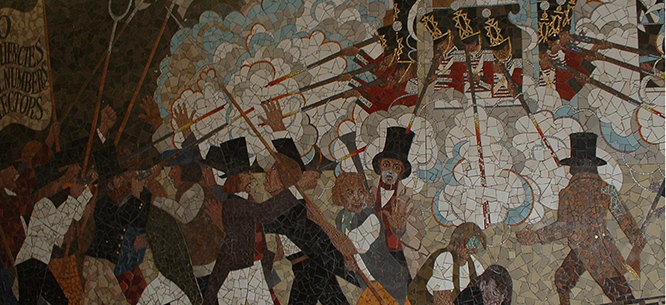Coalition Socialism
Coalition Socialism
The intertwined relationship between liberalism and socialism offers important lessons for today’s fractious intra-left fights.

Citizen Marx: Republicanism and the Formation of Karl Marx’s Social and Political Thought
by Bruno Leipold
Princeton University Press, 2024, 440 pp.
The Political Theory of Liberal Socialism
by Matthew McManus
Routledge, 2024, 268 pp.
In June, somewhere between 4 and 6 million Americans showed up to No Kings Day demonstrations in more than 2,100 cities and towns across the country. Observers estimated that this was the largest single-day protest in U.S. history since 1970, exceeding the mass demonstrations of the civil rights and anti–Vietnam War movements, the anti–Iraq War protests of 2003, and the mobilizations against police brutality after the murder of George Floyd in 2020. Indivisible, the progressive protest organization formed during Donald Trump’s first administration, led the organizing effort. A sprawling coalition of over 200 other groups, including labor unions, advocacy groups, and faith-based organizations, joined them in a massive show of defiance against the Trump administration’s drive to consolidate an authoritarian, oligarchical, and white supremacist regime.
The country’s largest socialist organization, Democratic Socialists of America, was conspicuously absent from the list of sponsoring organizations, though many DSA members (myself included) and local chapters mobilized for marches and rallies in their own capacities. Unfortunately, this was consistent with the political orientation of DSA’s current national leadership, whose majority is too wary of working in coalition with organizations and movements that are not explicitly socialist.
This was not, of course, the first time socialists took a sectarian stance toward developments outside their own ranks, nor will it be the last. Despite this stubbornly persistent tendency, however, the socialist movement has often been enriched and renewed through engagement with other political traditions and movements. In the present moment, traditions like republicanism and liberalism, which are rooted in opposition to arbitrary and despotic modes of rule, seem particularly worthy of engagement.
In his excellent book Citizen Marx, the political theorist Bruno Leipold demonstrates in great detail how important such engagement was to Karl Marx himself. Leipold argues that the traditional account of Marxism’s three main sources—German philosophy, English political economy, and French socialism—is incomplete, because it omits the formative role of nineteenth-century European republicanism in Marx’s political thought. Among its many valuable contributions to the vast literature on Marx and Marxism, Citizen Marx establishes, against critics like Hannah Arendt, how fundamentally political and democratic Marx’s socialism was.
In On Revolution, Arendt takes Marx to task for his “obsession with the social question and his unwillingness to pay ...
Subscribe now to read the full article
Online OnlyFor just $19.95 a year, get access to new issues and decades' worth of archives on our site.
|
Print + OnlineFor $35 a year, get new issues delivered to your door and access to our full online archives.
|





